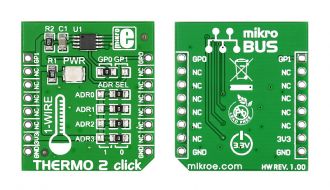
We strongly encourage users to use Package manager for sharing their code on Libstock website, because it boosts your efficiency and leaves the end user with no room for error. [more info]

Rating:
Author: MIKROE
Last Updated: 2019-05-27
Package Version: 1.0.0.1
mikroSDK Library: 1.0.0.0
Category: Temperature & humidity
Downloaded: 6817 times
Followed by: 4 users
License: MIT license
Thermo 2 click carries DS1825, a programmable resolution digital thermometer IC. It measures temperature within a range from –10°C to 85°C with ±0.5°C accuracy.
Do you want to subscribe in order to receive notifications regarding "Thermo 2 click" changes.
Do you want to unsubscribe in order to stop receiving notifications regarding "Thermo 2 click" changes.
Do you want to report abuse regarding "Thermo 2 click".

Library Description
The library covers all the necessary functions to control the Thermo 2 click board. The library performs the communication with the device via 1-Wire protocol by writing to registers and by reading from registers.
Key functions:
void thermo2_gpioDriverInit (T_CHARGER_P gpioObj) - Function initializes GPIO driver for the desired MIKROBUS1.Examples description
The application is composed of the three sections :
void applicationTask()
{
thermo2_readScratchpad();
Delay_ms( 100 );
FloatToStr( temperature, logText );
mikrobus_logWrite( " Temperature : ", _LOG_TEXT );
mikrobus_logWrite( logText, _LOG_TEXT );
mikrobus_logWrite( degCel, _LOG_LINE );
Delay_ms( 3000 );
}
Additional Functions :
Other mikroE Libraries used in the example:
One_WireUARTConversionsAdditional notes and informations
Depending on the development board you are using, you may need USB UART click, USB UART 2 click or RS232 click to connect to your PC, for development systems with no UART to USB interface available on the board. The terminal available in all MikroElektronika compilers, or any other terminal application of your choice, can be used to read the message.